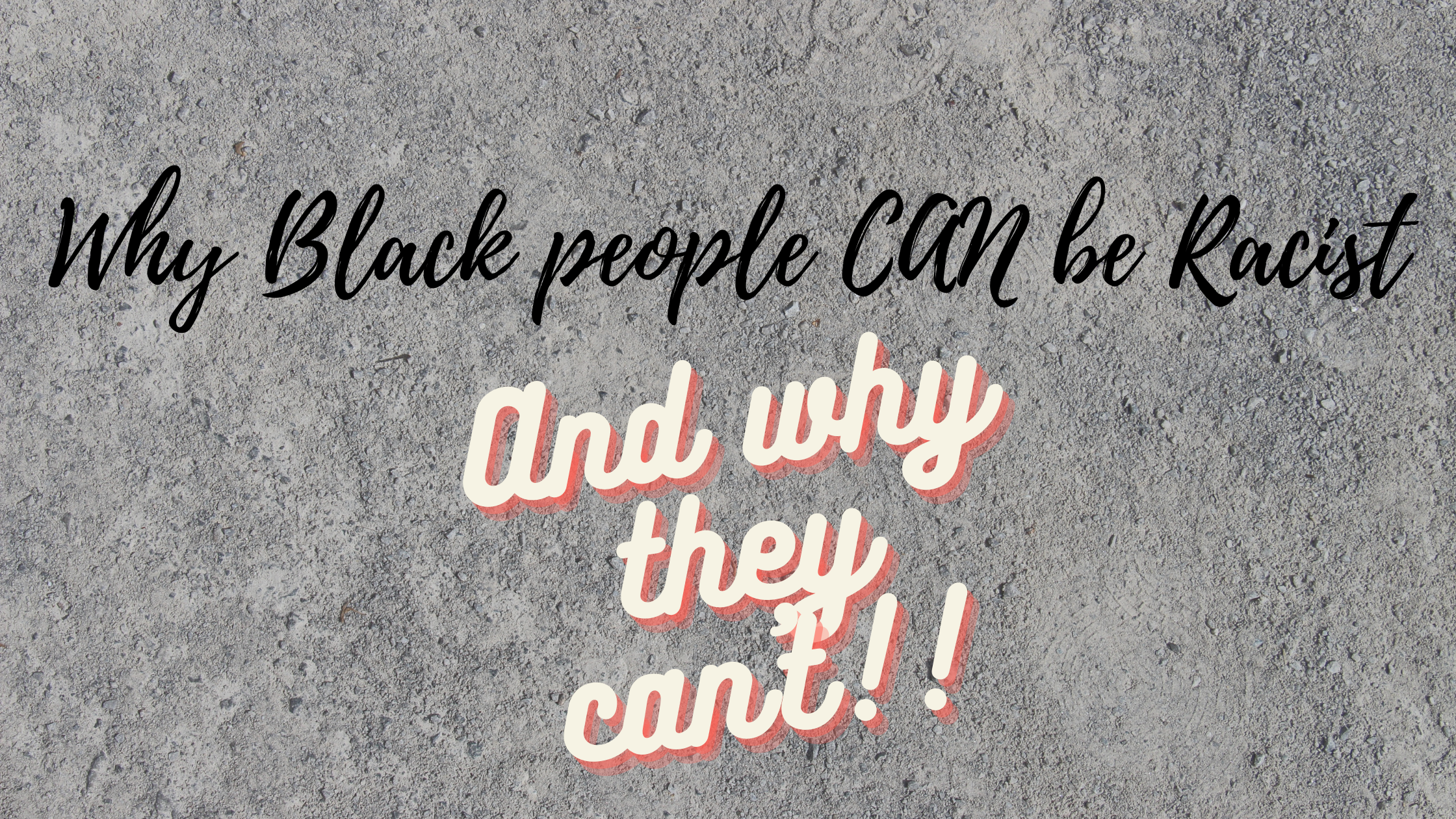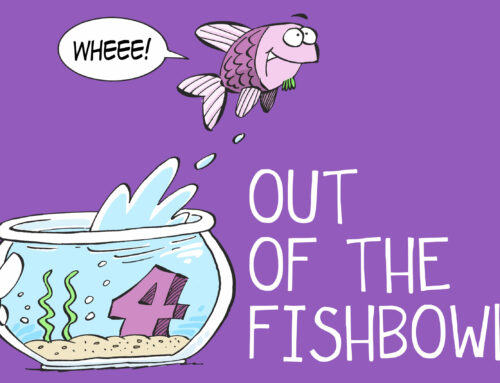i have found that racism definitions can often create a bit of a problem…
Can a black person be racist? Yes, absolutely. And also, no, not at all!
This question comes up a lot and i’m not sure i have actually answered it on my blog but i thought it might be helpful to at least give it a try. This is how i understand this question.
Two Definitions
The biggest problem which i have witnessed time and time again as far as the idea of who can be racist and who cannot be, is that we are dealing with two definitions of racism:
Definition 1: The definition most of us grew up with was this notion of hating someone of another race. If that is the definition of racism them of course anyone can be racist, because there are people of all races who hate or are prejudiced against people of other races. i don’t think anyone would seriously debate this.
Definition 2: However, a more recent definition, one that tends to be used by activists and academics, includes the notion of prejudice AND power. Even dictionaries were updated last year to reflect this shift in the definition of the term. Merriam-Webster updated their definition of racism to include: ‘the systemic oppression of a racial group to the social, economic, and political advantage of another.’

Missing each other
The problem comes when two people, each holding a different definition of racism, come face to face without realising or acknowledging that difference.
So typically an activist will be saying ‘Black people cannot be racist!’ because they don’t see black people as a group having the same kind of power to be able to create a system like slavery, apartheid or Jim Crow laws and suppress white people in that way. So they would definitely admit that black people can hold prejudice against white people, but they can’t be racist.
Then you have a white person who sees racism as hating a person of another race and they have witnessed a black person who hates white people and so are adamant that ‘Black people can be racist!’
The irony is that they are both right. But until they meet each other on the same page with regards to how they define racism, they will continue to bump heads and think that the other person is completely misguided.

Ignorance vs Stubbornness
This might be the unpopular piece of this post. And i am open to hearing alternative views. But this is mine right now.
When the two opposing views collide, it is typically ignorance on behalf of the ‘black people can be racist’ crowd as they are holding to the definition they know and grew up with and tend to not be aware that there is a different definition out there.
With the ‘black people can’t be racist’ crowd though it tends to be stubbornness. Because these are generally people who embrace critical thinking and thus should be aware that many people out there are holding on to an out-of-date or incomplete definition.
So when the two come face to face i would expect the academics and activisits to be more aware of the distinction and more able to pause and explain the difference to help get everyone on the same page.
But typically what happens is you have a ‘he said – she said’ kind of affair where both sides just end up saying ‘Black people can be racist’ or ‘Black people can’t be racist’ louder and louder and then eventually insulting the other person, dropping a meme and peacing out!
This is a difficult one to call because, once again, the onus falls on the person who has done more work or received more abuse to be the bigger person and take on the effort of explaining and bringing the other person up to speed. My only response to that is to say that it is unfair, but ignorance cannot be helped without education and stubbornness most definitely can be helped with grace and patience.
So i get why it escalates and i understand why the person with the power + prejudice definition feels like they shouldn’t have to be the one to explain, but i’m just not sure it can happen the other way because the person doesn’t have the means.

This is another space for white people to take the initiative in terms of explaining these things to their white people so that the burden doesn’t fall on black people to do so. Something as simple as racism definitions being unpacked can really open up further conversation that might otherwise have been blocked.
The same applies to coloured and indian people as well with regards to this whole post.
This feels like such an important piece for us all to get because so many longer, more valuable, and in-depth conversations get missed out on or lost completely because we miss each other in the opening statement.
= = = = = = = = = =
EDIT: Some helpful feedback on this post has caused me to think more deeply so i thought i would share it here for your benefit as well:
From @KaraboNkabinde6
‘Even on an interpersonal level.
Hate is normal if it has a valid basis (prejudice), but hate is abnormal if it has no logical basis (racism).
A Black person wud hate Whites because he associates them with oppression.
A White person hates Blacks, because he just hates them.’
From @CiandriZ
‘I think a big distinction is racism versus prejudice. Unfortunately even those faced with the updated definition, refuse to accept it, because it doesn’t fit for the way they want to express their views and the rhetoric they have framed their argument around.’
‘And I don’t think it’s entirely correct for us to say as white individuals “Well black people can be racist by the old definition!”. No. The definition has been updated for a reason, and updated by experts in the field, so we shouldn’t hold on to the old one in any form.’
[If you found this helpful, please feel free to share it around or tag white friends in it so that they might hopefully benefit, and also feel free to direct your white friends to this series i am doing on practical ideas as a response to white people asking: But what can I do about race?’]





![The Road to the Catan World Champs in Malta 2022! [Part II]](https://brettfish.co.za/wp-content/uploads/2022/11/IMG_9944-scaled-e1669831201283-500x383.jpg)
![The Road to the Catan World Champs in Malta 2022! [Part I]](https://brettfish.co.za/wp-content/uploads/2022/11/catanchampionships-500x383.jpg)
Thanks for the article and the clarification with respect to differing definitions. I have a question to you and perhaps also to those whose contributions you quoted underneath your piece:
I understand you all as saying that according to the updated, ‘prejudice+power’-definition of racism, black people cannot be racist. This, to me, seems either to refer exclusively to spaces/systems that are dominated by white people or to imply that spaces/systems without white domination do not exist. Now, a white friend of mine has been living in a rural Kenyan village for 30 years, sharing the living standard and ways of doing life (incl. languages he had to learn) of the people around him. He told me more than once that despite having made his home their such a long time ago, he is frequently treated with a lot of (racial?) prejudice, people making it clear to him that he doesn’t really belong and that with respect to their ways of life he is and will always remain inferior.
To me, it isn’t really important whether to label such behaviour and attitudes by black people as racism or not. But with respect to the ‘racism=prejudice+power’ definition I think it is an important question to consider whether in a context where black people run the show (and which white people in South Africa rarely expose themselves to …), black racism against whites is really unthinkable. If it is, I wonder why that would be. Can we simply not imagine a world where black people are in dominant / white people in inferior positions? If this was the case, it would feel a lot like having resigned to seeing black people as powerless by definition – an idea that goes against the grain of what I (and I assume you and many others as well) believe in.
Perhaps you can point out a fault in my argument but right now it seems to me that the conviction that ‘black people cannot be racist’ really depends on the context we find ourselves in. I know we’re talking about ‘systems’ here but it is also true that ‘systems’ can be found at different levels. For example, I suppose if I as a white person became a member of the ANC or the EFF it would be quite hard or even impossible to gain power and influence in terms of networks, trust, etc. so that I would find myself being at a considerable systemic disadvantage in comparison to people of colour.
Would be great to hear your or others’ thoughts on that.
Another thought with regards to the change in definition of racism by Merriam-Webster: From the above-linked article (https://www.forbes.com/sites/janicegassam/2020/06/11/merriam-webster-is-changing-the-definition-of-racism-to-reflect-systemic-oppression/?sh=2eb76279400f) that comments on that change it appears that it was changed specifically with the US-American context in mind:
“If the definition of racism doesn’t fully encompass the systemic oppression that Black people have experienced in America, there will be a lack of understanding and acceptance from the wider majority.”
I don’t want to imply that South Africans cannot or should not find sense in this change of definition but would like to caution to not over-eagerly equate the US-American with the South African context. I am aware of similarities but there are differences as well which may impact on the understanding and experience of racism.
Regarding the above comment, i was thinking about the same points regarding the redefinition (which was changed by an academic elite not by the populace who as a result needs to be educated about this change) and also about that concept of power perpetually being in white hands. At what point can we observe that power resides elsewhere (in the Eastern Cape pretty much all power politically and administratively is not held by whites. So can black politicians be racist now?) And in another country or domain, what is the sign that power has been replaced, is it when the 20 richest people in south Africa are not white (financial power)? Are we there yet? Transposing American ideologies (which in my humble opinion are faulty and not ideal, and do not have a positive end goal for healed relationships) onto a South African context is unlikely to help us heal.